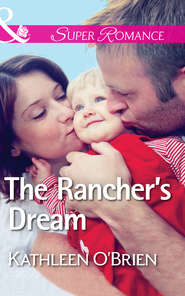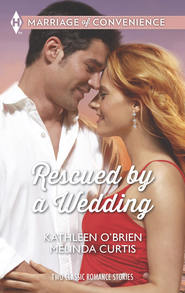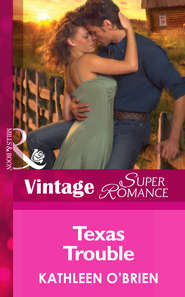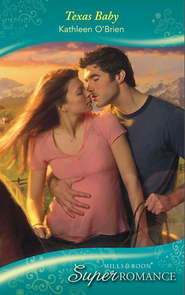По всем вопросам обращайтесь на: info@litportal.ru
(©) 2003-2024.
✖
Everything but the Baby
Автор
Год написания книги
2018
Настройки чтения
Размер шрифта
Высота строк
Поля
Everything but the Baby
Kathleen O'Brien
“You’re confused, and you’re hurt, and you’re lonely. You’re looking for someone to put all those broken dreams back together again.”
“Maybe,” Allison said slowly. “But is that so wrong?”
“It’s not wrong at all. It’s just that…I’m not that guy.” Mark’s voice had hardened. “I’m just one more selfish bastard who wants something from you.”
She felt her heart tripping against the palm she held to her chest. “What do you want?”
“To touch you. To make love to you. But that’s all. You need to understand that. The only difference between me and Lincoln Gray is that I’m willing to admit it. And that’s not enough for you, is it? You want more than that.”
She could hardly think clearly, standing here with her dress unzipped and a desire like nothing she’d ever experienced pulsing through every vein. But she had to think clearly. This unnamed emptiness, this hunger to connect with another human being, had already made her do one very stupid thing. Somehow she had to master it.
“Yes,” she said finally, though she knew it meant this sizzling, thrilling interlude was over. “I’m sorry, Mark. I want a whole lot more than that.”
Dear Reader,
Growing up, I believed there was something magical about being Irish. Irish tenors, poets, humor, legends…my father made sure we revered them all. The old joke “If you’re lucky enough to be Irish, you’re lucky enough” was solemn truth in our house.
Even annoying things could be made acceptable, by association. When I complained that I had dark shadows under my eyes, my father smiled and said, “Of course you do. God put in Irish eyes with sooty fingers.” He may have made that line up, but it contented me…though when I reached my teens, it didn’t stop me from buying concealer by the bucket!
I later came to understand that all families cherish their heritage just as much as we did ours. But thanks to my father, I’ll always appreciate the Irish in a special way—and I’ll always feel “lucky enough.”
So when it came time to create a family that could laugh, sing, warm and charm Allison Cabot, the heroine of Everything but the Baby, out of her loneliness, I knew what she needed. Enter the O’Haras—a big, emotional Irish clan who, like ours, chases sorrow away with rousing, off-key renditions of “When Irish Eyes Are Smiling.”
With the O’Haras by her side, Allison can finally learn to take risks, to live and love without fear. And that’s the wish I wish for all of you.
I hope you enjoy her story.
Warmly,
Kathleen
Everything but the Baby
Kathleen O’Brien
www.millsandboon.co.uk (http://www.millsandboon.co.uk)
ABOUT THE AUTHOR
Four-time finalist for the Romance Writers of America’s RITA
Award, Kathleen is the author of more than twenty novels for Harlequin Books. After a short career as a television critic and feature writer, Kathleen traded in journalism for fiction—and the chance to be a stay-at-home mother. A native Floridian, she lives with her husband just outside Orlando, only a few miles from their grown children.
CONTENTS
CHAPTER ONE
CHAPTER TWO
CHAPTER THREE
CHAPTER FOUR
CHAPTER FIVE
CHAPTER SIX
CHAPTER SEVEN
CHAPTER EIGHT
CHAPTER NINE
CHAPTER TEN
CHAPTER ELEVEN
CHAPTER TWELVE
CHAPTER THIRTEEN
CHAPTER FOURTEEN
CHAPTER FIFTEEN
CHAPTER SIXTEEN
CHAPTER SEVENTEEN
CHAPTER EIGHTEEN
CHAPTER ONE
AT FIRST, when Allison Cabot realized that her bridegroom wasn’t just late, stuck in Boston’s rush-hour traffic or locked in battle with a recalcitrant tuxedo, it felt like a dream. One of those ridiculous over-the-top nightmares, the kind you recognize as fiction even while you’re sleeping, because nothing that bad ever happens to you in real life.
Oddly, she felt no anger, certainly no pain, though someone shoved a tissue into her hand as if they expected her to dissolve into a puddle of tears. Instead, she felt numb. She floated about an inch above the floor, bathed in the sweet scent of altar roses, watching the drama play out while she waited to wake up.
Maybe, she thought, she had finally absorbed a little of her father’s elegant WASP restraint. Public displays of emotion were unacceptable for the Cabots. Play through, play through, that had been Ripley Cabot’s motto, whether Allison was coping with her mother’s death or a broken toe at soccer practice.
Or getting jilted at the altar.
While she was floating peacefully—the lobotomized bride—someone else sent the two hundred wedding guests home. Probably Bitsy Bohannon, her best friend and wedding planner. Bitsy looked like a golden fairy but had the field instincts of a five-star general.
It was Bitsy who had come back into the dressing room afterward and asked Allison what she wanted to do next.
“Actually,” Allison had said, after considering the matter for a minute, “I’m hungry. I’d been looking forward to that filet mignon at the reception.”
Kathleen O'Brien
“You’re confused, and you’re hurt, and you’re lonely. You’re looking for someone to put all those broken dreams back together again.”
“Maybe,” Allison said slowly. “But is that so wrong?”
“It’s not wrong at all. It’s just that…I’m not that guy.” Mark’s voice had hardened. “I’m just one more selfish bastard who wants something from you.”
She felt her heart tripping against the palm she held to her chest. “What do you want?”
“To touch you. To make love to you. But that’s all. You need to understand that. The only difference between me and Lincoln Gray is that I’m willing to admit it. And that’s not enough for you, is it? You want more than that.”
She could hardly think clearly, standing here with her dress unzipped and a desire like nothing she’d ever experienced pulsing through every vein. But she had to think clearly. This unnamed emptiness, this hunger to connect with another human being, had already made her do one very stupid thing. Somehow she had to master it.
“Yes,” she said finally, though she knew it meant this sizzling, thrilling interlude was over. “I’m sorry, Mark. I want a whole lot more than that.”
Dear Reader,
Growing up, I believed there was something magical about being Irish. Irish tenors, poets, humor, legends…my father made sure we revered them all. The old joke “If you’re lucky enough to be Irish, you’re lucky enough” was solemn truth in our house.
Even annoying things could be made acceptable, by association. When I complained that I had dark shadows under my eyes, my father smiled and said, “Of course you do. God put in Irish eyes with sooty fingers.” He may have made that line up, but it contented me…though when I reached my teens, it didn’t stop me from buying concealer by the bucket!
I later came to understand that all families cherish their heritage just as much as we did ours. But thanks to my father, I’ll always appreciate the Irish in a special way—and I’ll always feel “lucky enough.”
So when it came time to create a family that could laugh, sing, warm and charm Allison Cabot, the heroine of Everything but the Baby, out of her loneliness, I knew what she needed. Enter the O’Haras—a big, emotional Irish clan who, like ours, chases sorrow away with rousing, off-key renditions of “When Irish Eyes Are Smiling.”
With the O’Haras by her side, Allison can finally learn to take risks, to live and love without fear. And that’s the wish I wish for all of you.
I hope you enjoy her story.
Warmly,
Kathleen
Everything but the Baby
Kathleen O’Brien
www.millsandboon.co.uk (http://www.millsandboon.co.uk)
ABOUT THE AUTHOR
Four-time finalist for the Romance Writers of America’s RITA
Award, Kathleen is the author of more than twenty novels for Harlequin Books. After a short career as a television critic and feature writer, Kathleen traded in journalism for fiction—and the chance to be a stay-at-home mother. A native Floridian, she lives with her husband just outside Orlando, only a few miles from their grown children.
CONTENTS
CHAPTER ONE
CHAPTER TWO
CHAPTER THREE
CHAPTER FOUR
CHAPTER FIVE
CHAPTER SIX
CHAPTER SEVEN
CHAPTER EIGHT
CHAPTER NINE
CHAPTER TEN
CHAPTER ELEVEN
CHAPTER TWELVE
CHAPTER THIRTEEN
CHAPTER FOURTEEN
CHAPTER FIFTEEN
CHAPTER SIXTEEN
CHAPTER SEVENTEEN
CHAPTER EIGHTEEN
CHAPTER ONE
AT FIRST, when Allison Cabot realized that her bridegroom wasn’t just late, stuck in Boston’s rush-hour traffic or locked in battle with a recalcitrant tuxedo, it felt like a dream. One of those ridiculous over-the-top nightmares, the kind you recognize as fiction even while you’re sleeping, because nothing that bad ever happens to you in real life.
Oddly, she felt no anger, certainly no pain, though someone shoved a tissue into her hand as if they expected her to dissolve into a puddle of tears. Instead, she felt numb. She floated about an inch above the floor, bathed in the sweet scent of altar roses, watching the drama play out while she waited to wake up.
Maybe, she thought, she had finally absorbed a little of her father’s elegant WASP restraint. Public displays of emotion were unacceptable for the Cabots. Play through, play through, that had been Ripley Cabot’s motto, whether Allison was coping with her mother’s death or a broken toe at soccer practice.
Or getting jilted at the altar.
While she was floating peacefully—the lobotomized bride—someone else sent the two hundred wedding guests home. Probably Bitsy Bohannon, her best friend and wedding planner. Bitsy looked like a golden fairy but had the field instincts of a five-star general.
It was Bitsy who had come back into the dressing room afterward and asked Allison what she wanted to do next.
“Actually,” Allison had said, after considering the matter for a minute, “I’m hungry. I’d been looking forward to that filet mignon at the reception.”











